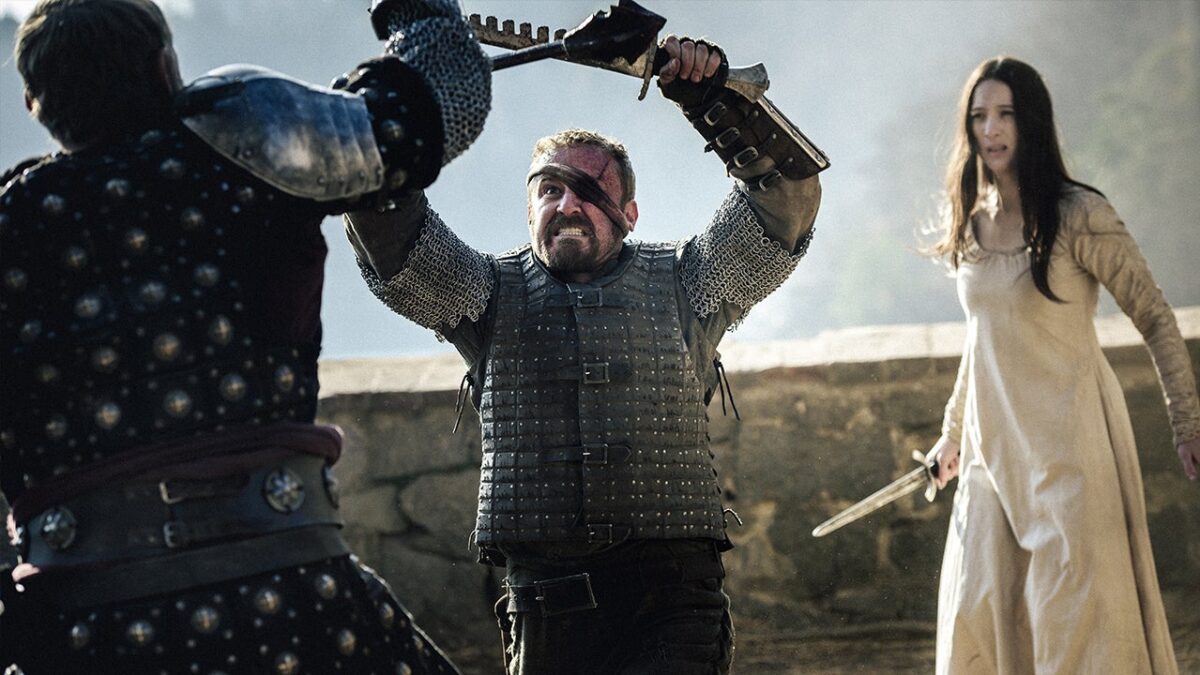“Think not that I am come to send peace on earth: I came not to send peace, but a sword,” Matthew 10:34. This verse expounds on the fundamental Christian paradox at the heart of the new film, “Medieval.”
To call the undertones of the film Christian would be an understatement, as it is an explicit story about a warrior for the faith. The story of Czech international hero Jan Žižka is a true treat for film buffs and casual moviegoers. The film features a well-rounded cast, with Ben Foster as Žižka and Michael Caine as Lord Boreš, a nobleman that enlists Žižka for protection.
Žižka is not only a great war general but also a Hussite. Little knowledge exists among the populace about post-Reformation Christianity and even less about pre-Reformation Christianity. Žižka would go on to fight in the Bohemian Wars (1419-1434) between the Catholic Church and the Hussites after the murder of Czech Christian pre-Protestant reformer Jan Hus. Hus serves as one of the primary inspirations for Martin Luther during the Protestant Reformation. To call yourself a Christian and know little to nothing about Hus is a product of the watered-down era of ignorance that defines life and art in a zombified Western culture.
The film doesn’t take place during the Bohemian Wars but serves as an origin story for the man that would become a Warrior of God (European title). It opens with Žižka (Foster) and his loyal band of mercenaries protecting Boreš (Caine) from being assassinated. This mysterious assassination attempt opens up the plot about the battle between a fallen noble class.
Til Schweiger plays Rosenberg, a Bohemian nobleman, set to marry Catherine (Sophie Lowe), the niece of the King of France. Catherine is a follower of Jan Hus and serves as the moral anchor for the film. Right away she is a woman of status horrified by the violent treatment of the peasant class. Her journey with Žižka begins when his mercenary group is pushed to kidnap her during a church service. Though she might seem the classic damsel in distress or a mere bargaining chip, she and Žižka develop a relationship over their concern for the common man that drives the entire film.
Lowe’s powerful performance is what maintains this delicate balance. Holding her own with Foster is what allows writer-director Petr Jákl’s vision to come to fruition. “Medieval” has no shortage of the violence we’re all accustomed to at this point. Jakl is able to expand his depth in a way that makes it clear this is a true passion project for him.
Jákl is able to deliver a strong historical drama because he understands the timeless nature of great film. Films depicting true events maintain a lasting legacy because they truly show Hegel’s point that though times may change, the people inhabiting them do not.
Jákl’s powerful story is made visually stunning by cinematographer Jesper Tøffner. The intimate camera angles employed make the film feel real at all the right times. Roland Møller plays Torak, the leader of his own mercenary group and foil to Foster’s Žižka. Torak’s depravity at the employ of the nobles knows no bounds. His blind loyalty to the ruling class calls the audience to question how much this still takes place in modern times.
We see the Trump-esque Rosenberg in particular enjoying the same flavor of immoral behavior one might imagine defined the affairs on Epstein island. In a tale as old as time, the film depicts the problem of what happens when leaders abandon any scruples whatsoever. Žižka, like us, is left to contend with a reality where oligarchs, including the so-called religious leaders, are not living up to the principles of the Christ they would claim to follow.
The title change from “Warrior of God” to “Medieval” for American audiences was obviously done to avoid an association with schlocky Christian dramas, but it says a lot about the present state of our country’s approach to the art of film. The only epics we have left are the tired franchises where any real true depth is watered down by intellectual property’s commitment to capital.
“Medieval” isn’t spared as there are not one but two video games associated with the film. A small price to pay because the film is more in line with classics like “Spartacus” and “The Ten Commandments” than whatever Marvel’s latest romp might be. Here we have the portrayal of a real historical figure that is wonderfully shot in an experimental way. The real tragedy is that our broken society provides little appetite for this type of art anymore, but thankfully that doesn’t mean it isn’t being made.
By the end, Foster’s Žižka is an eye-patched bona fide badass no longer willing to be led by anybody but the God he believes in. “Medieval” is a modern marvel that benefits from the innovations in technology that its predecessors lacked.
Save for some brief words from Viktor Krištof in an ethereal portrayal of Hus, “Medieval” is 100 percent an action movie. Unlike Branagh’s “Henry V” which relies heavily on the words of Shakespeare to carry it, “Medieval’s” action speaks louder than words. Ambitious is the first word that comes to mind in imagining a Christian action movie, but Jákl delivers. The movie treads in the same waters as Mel Gibson’s “The Passion of the Christ,” but this time the violence inflicted upon Jesus is done to the people he died for.









